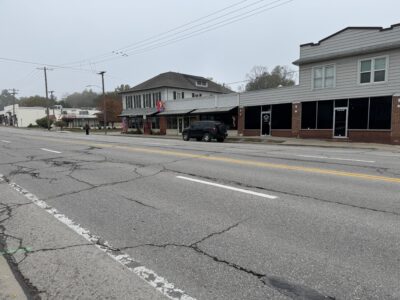Tied vote in Planning Commission sends rezoning request that could allow for 24-unit apartment development to City Commission

photo by: Bremen Keasey
The vacant lot at the corner of West Third Street and Michigan Street in Lawrence. The City Commission Tuesday night approved a rezoning request that could pave the way for a 24-unit apartment complex.
The Planning Commission split its votes, 4-4, on a rezoning request for a piece of land near LMH Health, paving the way for a decision by the Lawrence City Commission on a proposed 24-unit apartment complex.
The Planning Commission neither approved nor denied a request to rezone the site on the southwest corner of West Third Street and Michigan Street to a zoning level that would allow for the development of the apartment complex.
The land, which currently sits vacant, is split between two residential zoning areas: one, R-7, that allows only single-family residential homes, and another, R-24, that allows multifamily dwellings. Katherine Weil, a planner with Lawrence’s Planning and Development Services Office, said the differing zoning caused many challenges for development.
Corby Rust, a worker with Landplan Engineering who was representing the property owner’s rezoning request, said the applicant had previously requested rezoning the area to R-32 in October, which would have allowed the construction of a three-story apartment complex. That request was denied, partly because the Planning Commission considered the development too dense.
Rust said the concept plan for the 24-unit complex would have 12 one-bedroom units and 12 two-bedroom units and include 32 parking spaces. Rust said the design of the parking lot would have exits and entrances on Third Street and Florida Street to try to avoid adding additional traffic on Michigan Street, which is a busier street.
Rust said by zooming out on the planning map one could see “quite a mix” of different housing and zoning options, adding that it was within walkable distance to the Sixth Street commercial area as well.
“It fits into everything going on around (the area),” Rust said.
Several members of the public disagreed. Rachel Stumblingbear, the president of the Pinkney Neighborhood Association, said in written public comment that the rezoning request’s allowed density would not fit the character of the surrounding neighborhood; a different zoning designation that would allow 12 to 15 units would be more appropriate for the location, she said.
Peggi Englehart said during public comment that although the rezoning request would make a “tidy map” for the zones, it would not match the land use, which mostly includes single-family housing and duplexes. She said changing the zoning to the denser option would impact the area’s quality of life, especially with increases in traffic.
“If this request is granted, it will forever change the nature of this modest, established neighborhood,” Englehart said.
Planning commissioners were split on whether they wanted to approve the request. Some wondered whether they could compromise by changing the zoning to a medium residential density option; others adamantly were against accepting a zoning change. In the end, because of multiple tie votes for both approving the rezoning request and denying the rezoning request, the request will go to the City Commission with no recommendation from the Planning Commission.
Because there is no recommendation, the City Commission’s vote will just need a simple majority.







